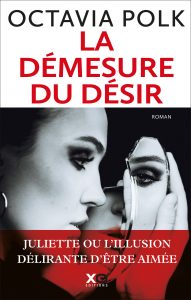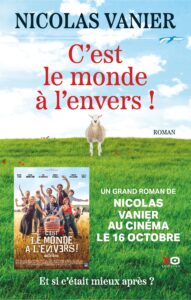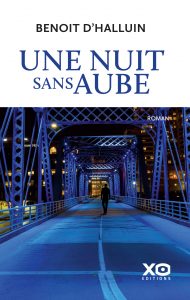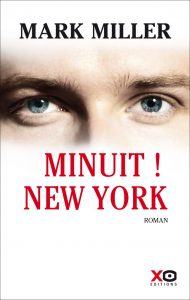Author's interview
On The Run is you second novel. How would you describe it?
It’s a novel which, through a love story, plays with the dramatic aspects of secret. What I wanted to do was to express the urgency of my character and her quest. Jeanne is in grave danger, not only because she feels tracked, but because secrets and guilt are slowly killing her. The discovery of a crime is a turning point for her. I like the idea of turning points in life. Sometimes they are obvious and shake you with brutality, sometimes they are insidious, almost unnoticed. The theme of the escape, the departure, has always fascinated me. The idea of slamming the door, changing everything, sometimes even like a “good housekeeper”: everything’s neat, clean, clear and final. The page is turned and they is no going back. This is surely the most feminine part of the novel, this capacity of women to leave. Maybe I am idealizing these courageous fugitives, but it takes recklessness to want to change everything and run towards the unknown. These escapes, rather than stampedes, are more rebirths to me.
The suspenseful intrigue that underpins the novel allows you to tackle more intimate and psychological themes, like family secrets, identity, twinship or even escape. Can you tell us more about it?
Family secrets are the base of our stories, of our lives. We all carry generational traces, and it is a formidable haven of stories. The character of Anne, Jeanne’s twin sister, imposed herself over the writing process, although I had not planned her. What interested me was to speak about a link strong enough to never leave you and with a possibility of violence; the idea of a double, the otherness and, mirroring, the identity. Who am I, who are you? These questions haunt us. Sometimes, answering the second one gives us the illusion that we know who we are, by a sort of shortcut. It is neither completely untrue of sufficient ever, of course.
At the start of your novel, your heroine is a fragile and broken woman, who has to face the external world’s violence. But in the end, doesn’t she have to face another form of violence, more internal this time, and from which she protects herself with amnesia?
Jeanne is a character that has been quite shaken by life. She has been holding on without flinching, like a good soldier, until that brutal external event – a crime – forces us to let go. The amnesia she suffers from is a way to speak about the illusions we keep holding on, about the strength of denial, the internal violence we inflict upon ourselves because the unknown seems far more formidable than a familiar pain. This “cavern instinct”, if I may call it that way, can sometimes imprison us in unsatisfying or tragic lives. On the contrary, what interested me with On The Run was to speck about the possibility of fleeing, not only to escape but to decide to jump. With this question: would we fall or fly?
On the run, Jeanne founds refuge in a small hostel in Biarritz where she will meet singular characters, and in particular Emil. Can you tell us about this Norwegian night watchman?
Sending Jeanne to Biarritz, a place of childhood happiness for me, was to put her somewhere safe. I wanted a hostel that would be like a shell, or a small and reassuring theatre in which Jeanne would be able to catch her breath, a place that would be both a shelter and an open door on the world. Emil’s character was first born from the need to go out of Jeanne’s head and to see her through another’s point of view. And this different point of view, before I really decided it, had to be foreign. Why Norwegian? I don’t know Norway, but I like the Scandinavian literature, and the challenge appealed to me. As for the love that surprises Jeanne, it is the last – or first – step of her release. And, more generally, it is the absolute resort of our stories. It became an evidence, as the pages went on. May it be self-love – the most difficult – or the love of another, nothing is more worth living for. Nothing without love, no salvation, no raison d’être. Neither glory, nor power, nor the violence of trauma, nor withdrawal can hold face to this marvel, this peace. Love, in On The Run, comes like an evidence.
Your powerful writing serves a constant narrative tension. How do you write?
I write as I’d like to paint, in touches that I successively brush, work and rework until I get a small melody. I need it to be vibrant, and rhythm is essential to understand. Senses too. It seems that with me words pass through the body more than they do through the brain. I need to feel the character’s emotions, to breathe them, to enter “under their skin”. I am also very intuitive, almost like a will to go blindly, without knowing. I like beyond measure writing about emotions, in an almost wild way. As a reader, I am quite insensitive to texts that are solely beautiful, or so polished and constrained that they don’t breathe any more. They end up boring me, because I can find no echo in them, and a world without echo is bound to be a little artificial.
How much is writing important for you? What place does it have in your life?
I’ve been writhing for a long time: theatre, poems, novellas, scenarios. This desire to write comes from my reading. I’ve made myself while reading. As a child, I read everything and anything. All that mattered was for the words to fill me, to console me, to give a shape to the world. Between nine and eleven years old, I went from the Gospels to Bob Morane. And then, in my teenage years, it was Victor Hugo and rather quickly the Russian shock: Dostoevsky. These major books get under your skin and built a vision of the world. In my path as an author, On The Run is for me a turning point. I’ve spent four years writing this novel and it accompanied me at an important moment of my personal life. It gives the feeling that I unlocked something and that I can access another fluidity. As soon as I can, I will dive into the next one. I don’t know yet what aspect it will have, but I can feel it coming, a vague shape and some swift desires, silhouettes, a child, and the themes that have always inspired me: childhood, difference, exile…
lire toute l’interview












